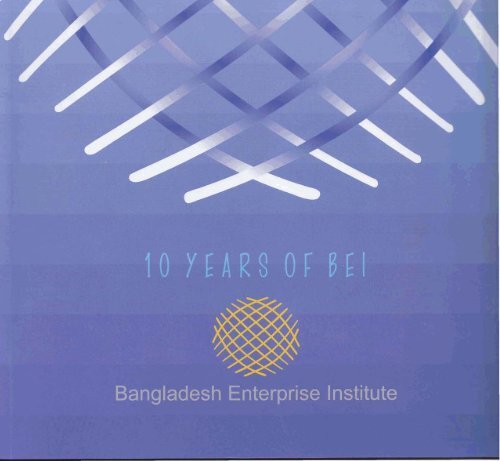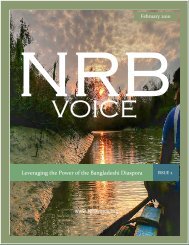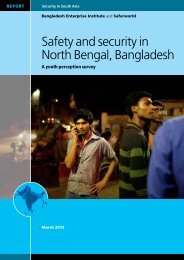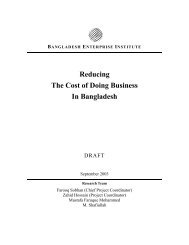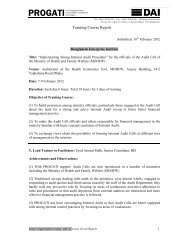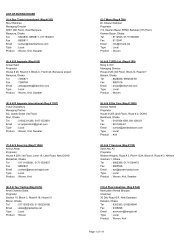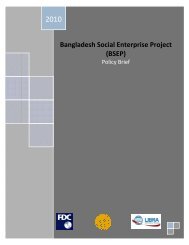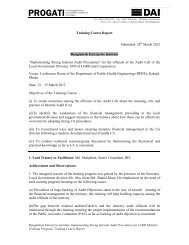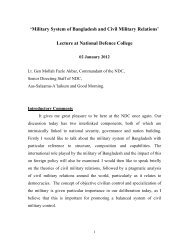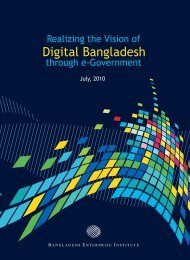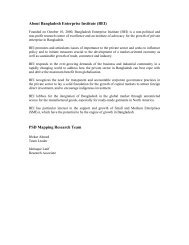Download - Bangladesh Enterprise Institute
Download - Bangladesh Enterprise Institute
Download - Bangladesh Enterprise Institute
Create successful ePaper yourself
Turn your PDF publications into a flip-book with our unique Google optimized e-Paper software.
Pages
..<br />
EI):<br />
stitutio<br />
growth OT<br />
I-<br />
ector of <strong>Bangladesh</strong> in recent years has assumed the role of the dominant force<br />
~owth and development of the country. In spite of the downturn in the global eco<br />
iifold challenges within the country, the private sector has shown a remarkable degre<br />
rtitude and ingenuity in taking the country forward, thriving on the vibrant 's<br />
d entrepreneurship' which has been the hall mark of the private sector in Bang<br />
1<br />
h great success comes great responsibility, and, with that in mind a group of six<br />
ntrepreneurs came together in October 2000 to form the <strong>Bangladesh</strong> <strong>Enterprise</strong> lnsti<br />
ntrepreneurs comprehended fully the necessity of appropriate policies and<br />
in order to bring into existence an environment fostering sustainable and accel<br />
Ithe private sector. It is with this realization that the Governors entrusted BE1 with<br />
kty of implementing a range of programmes during the past ten years designed to h<br />
L-<br />
improl investment climate in the country and helping the private sector to become<br />
competitive he global market.<br />
*<br />
I<br />
It is a matter of great satisfaction br the members of the Board of Governors and myself that BE1 is celebrating its 1<br />
Anniversary on 10th October, 2010,<br />
Since its inception, BE1 has become a significant institution in promoting private se<br />
development to help <strong>Bangladesh</strong> rate and function in an increasingly globalized world. For an organization as youn<br />
BEI, t am proud to acknowledge tha has shown great initiative for the growth and development of the private sector.<br />
studies undertaken by BE1 and the! =~dsequent reports it has released, have focused on the need to reform and reva<br />
whole range of policies in order to I bromote and foster the growth and development of the private sector in Bangla<br />
pursuance of this objective, BE1 6- organized numerous seminars, workshops, training sessions, consultations and di<br />
on a wide variety of subje~ts~details' )which follow in other sections of this report.<br />
1<br />
The latest Annual Report of BE1 for tl ~eriod October 2008 to September 2009 reflected the wide range of work undertak<br />
by %El, which we believe has contri ed to improving the investment climate in the country and also contributed to t<br />
growth and development of the pri e sector.The Board of Governors can take great satisfaction that during the past t<br />
years BE1 has played a pioneering I le in working closely with the government in trying to remove some of the exist<br />
barriers to doing business in the cot Rtry, in undertaking training programmes for government servants in the field of priv<br />
sector development and above all pr ding a platform for regular dialogues between the government and the private secto<br />
I would like to congratulate Amba<br />
undertaking and successfully implev<br />
excellence.<br />
Our institutions need to be strength<br />
international situation provide both<br />
and dealing with climate change ha<br />
expansion of our export' based econ<br />
understood at BE1 and must be and wl<br />
Governors I would like to reaffirm o<br />
investment climate in the country, to<br />
doing business in the country.~hi; wi<br />
1<br />
idor Farooq Sobhan, President, BE1 and his committed team of professionals<br />
iting various projects.Their dedication and hard work has truly made BE1 a centre<br />
bd and our markets need to be further developed; the global economy and the over<br />
3ortunities as well as challenges to be dealt with; the problem of countering terrori<br />
to dealt with on a priority basis; human resource development and the growth a<br />
~y has become more complex and dificult.These challenges are well recognized a<br />
be addressed in the near future.Therefore, in the years ahead on behalf of the Board<br />
r commitment to foster and promote private sector development, to improve<br />
YV~rk closely with the Government in creating a peaceful and healthy environment<br />
be the goal and mission of BE1 during the next ten years.<br />
Salrnan F. Rahman<br />
Chairman<br />
Board of Governors<br />
<strong>Bangladesh</strong> <strong>Enterprise</strong> lnstit
I<br />
ten years back, and has today emerged as a key repository of<br />
sector development and best practices in the country. Since its<br />
simultaneously on two fronts. On the one hand, we<br />
note private se4tor development in <strong>Bangladesh</strong>, and on the other we ha<br />
4ge and facili ate best practices within the corporate and private sector in<br />
lesh. Our achie f ements in both areas are noteworthy and have been th b result of<br />
/e cooperation and consultation with all the stakeholders.<br />
i Deen actively dromoting private sector development (PSD) in <strong>Bangladesh</strong> since its<br />
esti shment ten years ago. BE1 has come a long way in realizing its vision tirough its<br />
varl s research pu d lications and policy papers; it has provided strong baseline<br />
infc.. ..<br />
ation to the pol/cy makers for legal and regulatory reforms on PSD in ~aln~lades<br />
which, along with its other notable :omplishments has he1<br />
ye the competitiveness of Banglad sh in the<br />
global market.<br />
t<br />
BE1 has provided a platform for reg r dialogues detween<br />
t, the private sector, developmen I partners,<br />
media, think tanks, academics, and r per relevant takeholders on a whole range of subjects. in particular, forPorate<br />
Governance, Corporate Social Reql ,ponsibility, E- d overnance, E-Commerce, leveraging the <strong>Bangladesh</strong>i Diaspora,<br />
Foreign Policy and Security, Reqio~ pal and Econo ic Cooperation, Regulatory and Economic Reforms. public Private<br />
Partnership, Trade and lnvestm t, Social Business I and Entrepreneurship, development of the SME sect r and in<br />
general on improving the investme : climate in th country.<br />
Corporate Governance has alway3 I<br />
the first Code of Corporate Goverr<br />
the implementation of the principl<br />
Governmental Organizations (NGI<br />
seminars, roundtables, consultat<br />
directors, senior management,<br />
organized by BEI. BE1 has also LC'<br />
regulatory framework of Banglades<br />
Yo be champions of Corporate Go<br />
(OECD), Global Corporate Goverr<br />
Secretariat and the International CI<br />
efforts to promote good Corporate<br />
In addition, our organization has<br />
<strong>Bangladesh</strong> and lndia and promoti~<br />
glven special importance to promc<br />
of civil society through regular dia<br />
that the key to a healthy business<br />
country has undertaken a number<br />
workshops, dialogues on Counter T<br />
: 1<br />
.i P I<br />
an issue ofimportance and interest to 6El. BE1 was responsible for d 6 veloping<br />
drawing on international best practices, and also romoted<br />
public listed companies, State Owned <strong>Enterprise</strong>s<br />
Ip<br />
and Non-<br />
Since 2004, BE1 has conducted over one hundrsd<br />
on Corparate Governance. More than 3000<br />
attended the Corporate Governance<br />
about policy reforms on Corporate Governan e in the<br />
international networks and agencies that are c 1 nsidered<br />
s the Organization for Economic Cooperation and Dev<br />
CGF), International Finance Corporation (IFC), Comm<br />
orate Govern nce Network (ICGN). In the near future. BE1 hopes to<br />
vernance in B 1 ngladesh.<br />
phasis on strengthening relations, facilitating trade between<br />
with lndia, China, the US and the European Union. We have<br />
co-operation in South Asia; to building th capacity<br />
relations and diplomacy. BE1 conscious o 'i the fact<br />
country is the need for peace and stabil ty in the<br />
projects on security related issues. We have conducted several studies, regional<br />
)rism, National Security and Civil-Military Relations in <strong>Bangladesh</strong>. BE1 h s<br />
e<br />
I<br />
i
-<br />
actively participated in a large number of international conferences and semin;<br />
close working relationship with several major think tanks and research institution<br />
on these subjects. %El maintain<br />
I over the world.<br />
BEl's endeavors and activities are committed to fostering an enabling enviror nt for private sector growth a<br />
development in <strong>Bangladesh</strong>. However, a crucial series of challenges lie ahead for<br />
t<br />
ngladesh in the very near future. I<br />
believes that the key to addressing these challenges is to improve the efficie of both the government and 1<br />
private sector in <strong>Bangladesh</strong>, an approach in which BEI, as a key platform for di logwe between all stakeholders, c<br />
play a very important role.<br />
--. -:, ;4-d8i.,7,<br />
, .- h.-,, ',. - 8 , .<br />
. .' ,.>,f,, .A,-& :.2j:#*-:>-, While BE1 will continue its present work, we hope in the future to pay special attention to key subjects like sk<br />
development, improving the flow of remittances, leveraging the <strong>Bangladesh</strong>i ~ias~ora, and in general to give, spec<br />
attention to the subject of Migration and Development. Currently BE1 has u'ndertaken a project on preparin:<br />
Migration Profile for <strong>Bangladesh</strong> in collaboration with the International Orginization for Migration (IOM). In I<br />
personal capacity I am currently serving on two International Commissions on Mi; tion and Development.<br />
' a:$~+-&s8<br />
a:;<br />
,'.A.<br />
)..ri. - -<br />
Before coGh.iding, I would like to take this opportunity to thank the BEI Board ,Governors for their guidance and<br />
support, our development partners for their confidence in us and my colleagu<br />
'& I<br />
t BE1 for their dedication and hard<br />
work, which has made it possible for BE1 to establish for itself, both at home and road, a reputation for excellence in<br />
its res<br />
rowth of private enterprise in B ladesh.<br />
1' -<br />
b<br />
Farooq Sobhan<br />
President<br />
.<br />
. 2<br />
I ~<br />
. .,.<br />
'<br />
I<br />
. r<br />
rl<br />
-
Ahn~r* RFI<br />
for advocacy for the growth of private enterprises in <strong>Bangladesh</strong>.<br />
I<br />
velopment of a market-oriented economy, as well as, sustainable<br />
h of trade,commerce and industry.To attain these goals, BE1 organizes<br />
ar consultations, dialogues, seminars and workshops, conducts<br />
rch and surveys, formulates policy measures and identifies issues<br />
ment climate of <strong>Bangladesh</strong>.<br />
<strong>Bangladesh</strong> as an economic<br />
Objectives<br />
- BE1 promotes and articulates issues of importance to<br />
the private sector and seeks to influence policy<br />
and to initiate measures crucial to the<br />
development of a market-oriented economy<br />
as well as sustainable growth of trade,<br />
e, self-reliant and integrated ..- commerce and industry<br />
e creation of an enabling<br />
- The institution responds to the ever-<br />
growing challenges of the business and<br />
industrial community in a rapidly changing<br />
world to address how the private sector in<br />
ent in <strong>Bangladesh</strong>, where private enterprises .:;<strong>Bangladesh</strong> can best cope with and obtain the<br />
r and sustain robust economic growth for the<br />
maximum benefafrom globalization<br />
d prosperity for the people.<br />
- The necessity for transparent and accountable corporate governance<br />
practices in all sectors to build a solid foundation for the growth of capital<br />
markets, to attract foreign direct investment and to encourage indigenous<br />
investment is recognized by BE1<br />
05<br />
- BE1 advocates the integration of <strong>Bangladesh</strong> in the global market through<br />
unrestricted access for her manufactured goods, especially for ready-made<br />
garments in North America, Europe and Asia
'ueyy leuey zeyu!yy*~yy uos s!y Aq pa3elda~ uaaq sey aH,
Focus Areas<br />
The ~an~ladeshhter~rise <strong>Institute</strong> while working t: ..3rds building a corporate Bz.;;ladesh<br />
to focus on certain areas which are listed below! *<br />
choosc
el<br />
bver the years, <strong>Bangladesh</strong> <strong>Enterprise</strong> hstitute's efforts have focused on<br />
numerous areas covering a diverse range of issues relating to the Comparative Analysis of Corporate Governance in South Asia: Charti<br />
development, growth and improvement of the private sector in a Roadmap for <strong>Bangladesh</strong><br />
<strong>Bangladesh</strong>. Some of the areas that BE1 has worked on in the past and Corporate Governance (CG) is considered globally as a prerequisite<br />
continues to work on are highlighted below:<br />
attracting foreign and domestic investment and to achieving efficiency<br />
economic growth which is essential for private sector development. Ag<br />
1. Competition policy this backdrop, BE1initiated a project on Corporate Governance in 2002 t~<br />
Advocacy and Capacity Building on Competition Policy and Law in Asia Comparative Analysis of Corporate Governance in South Asia: Chartin<br />
(7Up2 Project) Roadmap for <strong>Bangladesh</strong>.BEI published a report in August 2<br />
Together with CUTS International, India, BE1 has<br />
which was a diagnostic study of corporate governa<br />
undertaken a project entitled "Advocacy and<br />
in India, Pakistan, Sri Lanka and <strong>Bangladesh</strong>.<br />
Capacity Building on Competition Policy and<br />
Law in Asia". This research and capacity<br />
building project was implemented in<br />
<strong>Bangladesh</strong> with support from DFID, UK to<br />
accelerate the process towards functional<br />
policy and law in the country. It was<br />
expected that the project will facilitate<br />
advancing an enabling environment in<br />
<strong>Bangladesh</strong>. As part of the project a tw<br />
rate Governance for Banglad<br />
Regional Launch Meeting was held in<br />
rs representing the govemm<br />
September 2004.The Regional Launch meeting drew participants<br />
and regulatory bodies, private sectors, chambers and associat~<br />
from South and South East Asian Countries.The issues of discussion were think-tanks, academics, media, lawyers and auditors etc met regularly<br />
strategies for collective action on competition policy and law through discuss and debate on each section of the Code and this was finalized a<br />
institutional partnerships in the region. Participats included India, published in April 2004.The Code prescribed Principles and Guidelines<br />
<strong>Bangladesh</strong>, Pakistan, Nepal, Sri Lanka, Vietnam, Lao PDR and Cambodia. how Corporate Governance csuld be gradually introduced in<br />
Moreover, two National Reference Group (NRG) meetings were held organization.The Code set the guidelines and standards for best pra<br />
involving the relevant stakeholders. Under the scope of this project a of corporate governance in key constituencies. This was the<br />
Country Report as well as a Country Advocacy Document was prepared on comprehensive Code of Corporate Governance consisting of provisions<br />
Competition Policy and Law in <strong>Bangladesh</strong>. Financial Institutions and NGOs,and was launched in April 2004.
I<br />
laate Governance Strengthening Project (CGSP)<br />
~<br />
thing the first comprehensive Code of Corporate Governa ce for<br />
sh, the next step was the implementation of the Code th ough<br />
and training programmes so that Chairmen, directors and L enior<br />
ent of Listed Companies, Banks and Financial Institutions, N GOs,<br />
e Owned <strong>Enterprise</strong>s have the necessary tools to appb the<br />
s within their organization. BE1 then started its work to raise<br />
regarding the cost and benefits of good corporate gover<br />
I<br />
ance<br />
mong different stakeholders under the Corporate Gover ance<br />
mber 2004, BE1 has conducted over one hundred serr(inars,<br />
s, consultations, and training programmes on Corp rate<br />
0<br />
f<br />
More than 3000 chairman, directors, senior manage ent,<br />
have attended the corporate governance progra mes<br />
der the project. BE1 has also been a catalyst in bringing bout<br />
s on Corporate Governance in the regulatory framewdrk i$<br />
various training and capacity building programmes B has<br />
la<br />
'I<br />
pool of experts who are equipped with the right skill and<br />
I pd regularly used by BE1 as resource persons in its works ops,<br />
mnferencer In addition, BE1 invited a number of leading<br />
'
I<br />
1<br />
More recently,BEI launched the Report on the Observance of Standards and 3. Corporate Social Responsibility (CSR)<br />
Codes (ROSC): Corporate Governance Country Assessment for <strong>Bangladesh</strong> United Nations Global Compact (UNGC)<br />
in May, 2010. The report, prepared by the World Bank, provides an In order to promote and facilitate the engagement of the private sector f<br />
assessment of <strong>Bangladesh</strong>'s Corporate Governance policy framework, uphold the 10 Principles of the United Nations Global Compact (UNGC), th<br />
highlights recent improvements in Corporate Governance regulations,<br />
makes policy recommendations, and provides investors with a benchmark<br />
against which to measure Corporate Governance in ~angladesh:<br />
Reporting on Corporate Governance in <strong>Bangladesh</strong><br />
Following the launching ceremony of ROSC, a three day<br />
interactive media workshop on Reporting on<br />
Corporate Governance in <strong>Bangladesh</strong> was<br />
successfully organized from May 30, 2010 to<br />
June 02,201 0. Based on the view that "better<br />
companies make better societies,"tthe 1<br />
overall objective of the programme was to<br />
draw on journalists' unique ability to<br />
disseminate information on Corporate<br />
Governance to the business community and<br />
I<br />
I<br />
i$h<br />
@<br />
<strong>Bangladesh</strong> <strong>Enterprise</strong> <strong>Institute</strong> and the CSR Centre, in collaboration wit:<br />
UNDP Dhaka, jointly launched the United Nations Global Compact LOG<br />
Network (UNGCLN) <strong>Bangladesh</strong> on 26 January, 2009.The project is a tw<br />
year venture which consists of training programmes, advocacy an<br />
outreach initiatives, and research and network development activitic<br />
supported by UNDP Dhaka.<br />
CSR in Action<br />
L<br />
I<br />
Ideally, CSR policy can function as a built-i~<br />
self-regulating mechanism whereby<br />
business will monitor and ensure il<br />
adherence to law, ethical standards, an<br />
international norms. BE1 has been activer<br />
involved in promoting CSR among ti<br />
various constituencies and sectors i<br />
to the wider reading public, and to make % <strong>Bangladesh</strong>. The institute has played<br />
readers aware of company activities that can have 0+4e significant role in promoting CSR in the countt<br />
significant impact on society. The workshop was a<br />
and continues to do so. With a vision of promoting tti<br />
collaborative effort of The <strong>Bangladesh</strong> <strong>Enterprise</strong> <strong>Institute</strong>, the<br />
concept of CSR in <strong>Bangladesh</strong>, BE1 has organized month]<br />
World Bank group and the IFC Global Corporate Governance Forum (GCGF). roundtable discussion titled "CSR in Action" in collaboration with KATALYS<br />
(implemented under the Ministry of Commerce (MoC) of the Governmer<br />
of <strong>Bangladesh</strong> by Swisscontact and GTZ lnternational Services) th<br />
BE1 is affiliated with international networks and -agencies that are<br />
considered to be champions of Corporate Governance such as the<br />
outcome of which was an independent centre named "CSR Centre<br />
established as a trust in September,2007.<br />
Organization for Economic Cooperation and Development (OECD), the<br />
Global Corporate Governance Forum (GCGF), lnternational Finance Moreover, to develop case studies highlighting the success of the firrr<br />
Corporation (IFC), the Commonwealth Secretariat and the International which already adopted CSR principles, BE1 had previously undertaken<br />
Corporate Governance Network (ICGN).<br />
project on CSR with the support of KATALYST in October,2004, to profile SI<br />
10
y responsible firms from different sectors that had good CSR<br />
ces.The five investigated sectors were Ready Made Garments (woven<br />
nit), Financial Institutions, Pharmaceuticals, Home Accessories and<br />
ESRB Guideline<br />
ith support from KATALYST, has developed an Environmentally and<br />
Responsible Business (ESRB) practices guideline for the banking<br />
Taking into account the relationships between banks and other<br />
al institutions on one side, and private enterprises on the other, both<br />
s of asset / lending and liability / deposit, these frequent interactions<br />
al institutions, therefore, have a tremendous potential to play an<br />
ant role in disseminating information among their commercial<br />
and in stimulating sustainable business practices.Empirical evidence<br />
ts that the level of awareness and understanding of ESRB practices i,<br />
ery prevalent among <strong>Bangladesh</strong>i private enterprises. Many<br />
ational banks and even some foreign-owned banks in <strong>Bangladesh</strong><br />
ready adopted CSR requirements into their loan policy, as part of<br />
stainable business strategy and risk assessment in terms of 'clean<br />
g'. In contrast, the majority of local banks are not aware of this<br />
t tool for promoting sustainable business.<br />
nr Roadmap for Transition of <strong>Bangladesh</strong> to Business to<br />
of the Internet since the mid-1990s has changed the business<br />
nt in <strong>Bangladesh</strong>. It further changed the interaction patterns<br />
*he commercial entities and the government. This worldwide<br />
ane of the core elements of ECommerce, electronic interaction<br />
Businesses and people for commercial purposes, <strong>Bangladesh</strong><br />
<strong>Institute</strong> understood the importance of E-Cammerce in<br />
11<br />
6angladesh.A.s a result BE1 undertook the project, "Charting ii Roadmap for<br />
Transition of <strong>Bangladesh</strong> to Business to Business eCommercen in<br />
December, 2004. The objective of the study was to produce a<br />
comprehensive research-based report that would provide a solid<br />
foundation for eommerce policy dialoguss and concrete strategic steps<br />
oriented SMEs), the government, the law makers and academia.The study<br />
was based on the literature review of Globgl trends in eCommerce, like the<br />
global growth of e-comrnerce, relevance of e-commerce for the developing<br />
countries, etc and the current state of preparedness in <strong>Bangladesh</strong> for e<br />
Commerce including the overall status of B2B and B2C e-commerce in<br />
<strong>Bangladesh</strong>, preparedness of the private sector, the government and the<br />
Information and Communication Technology (ICT) Industry to support e<br />
Commerce.The study also came up with separate recommendatio& and<br />
artions for the industry associations, individual firms, government and<br />
§,Foreign Policy and Security<br />
BE1 has, over the last few years, undertaken a number of studies and<br />
workshops on foreign policy and security, including producing a 'Counter-<br />
TerrolJsrn Strategy Paper for <strong>Bangladesh</strong>', in collaboration with government<br />
officials and civil society experts. BE1 has also organized workshops, such as<br />
kr police officers and prosecutors to effectively counter terrorism,as well as<br />
a workshop on non-traditional securiv challenge In South Asia. BE1 has<br />
also produced a number offoreign policy and security publications.<br />
Towards Developing a Better Counter Temrism Regime in <strong>Bangladesh</strong><br />
BEI, in partnership with the Government of Denmark, has undertaken a<br />
three-year project on countering terrorism.The project would focus on the<br />
long-term objective of strengthening the counter-terrorism regime through<br />
advocacy for a government-owned and implemented National Counter<br />
Terrorism Policy.<br />
<strong>Bangladesh</strong>-India Security Dialogue -
BEl, in collaboration with the Observer Research Foundation in Delhi, held<br />
two dialogues entitled '<strong>Bangladesh</strong>-India Security Dialogue', in December<br />
with support from the Asia Pacific Center for Security Studies (APCS<br />
Honolulu, in November 2009 in Dhaka.The workshop aimed to stimule<br />
2009 and March 2010,in Dhaka and Delhi respectively. Both dialogues were dialogue among a broad spectrum of security sector and civil governme<br />
undertaken, with support from the U.S. Embassy in Dhaka, with the<br />
objective to bring together policymakers, law enforcement agencies and<br />
civil society representatives to discuss security issues of importance to both<br />
<strong>Bangladesh</strong> and India.<br />
People Peace-Building Programme<br />
BEl, in partnership with the Australian High Commission in<br />
Dhaka, has undertaken the Regional Communities<br />
Outreach Programme. The project is against the<br />
backdrop of increasing concern over the<br />
involvement of madrassa students in<br />
terrorism and the need for inter-agency and<br />
people-agency cooperation in combating<br />
terrorism in <strong>Bangladesh</strong>.<br />
Regional Workshop for Police Officers and<br />
workshop was to enhance the counter-terrorism capacities of law<br />
enforcement personnel in the region.<br />
National Security and Civil-Military Relations in <strong>Bangladesh</strong><br />
BEI, in association with the <strong>Bangladesh</strong> <strong>Institute</strong> of International and<br />
Strategic Studies (BIISS),also organized a workshop on<br />
B<br />
"National Security and Civil-Miliary Relations in <strong>Bangladesh</strong>,"<br />
and non-governmental officials and to develop actionable recornmendl<br />
steps to improve national securii and civil military cooperation to achie<br />
national goals.<br />
In July 2010, the <strong>Bangladesh</strong> <strong>Enterprise</strong> <strong>Institute</strong>, with support of tl<br />
Defense Institutions Reform Initiative (DIRI), from the Office of the U<br />
Secretary of Defense, held a Civil-Military Relations workshop in Dha<br />
on Combating Terrorism in <strong>Bangladesh</strong>: Developing<br />
National Counter-Terrorism Strategy. The workshc<br />
1.. had two major objectives: the first objective w<br />
n to contribute to the efforts for enhancing tl<br />
national security of <strong>Bangladesh</strong>, in gener<br />
~uld.dnk~~lli~<br />
-9nrr<br />
-.nsrrwrrr+*rlwms~aa*--.~-<br />
p<br />
DUDBU - and improving and strengthening the ci\<br />
military relations in the country,<br />
> ,<br />
particular. The other objective was<br />
construct a comprehensive national strate'<br />
for combating terrorism in <strong>Bangladesh</strong>. TI<br />
Prosecutors in South Asia on Effectively<br />
was the first in a series of four workshops to ta<br />
Countering Terrorism<br />
/<br />
: place during 2010-11.<br />
BE1 organised a threeday "Regional Workshop for 1 .,.- -<br />
\*ds"O<br />
Police Officers and Prosecutors in South Asia on Effectively ession ofthe Bang\adesb<br />
Non-traditional security challenges in South Asia: 2025<br />
Countering Terrorism" in November 2009 in Dhaka. The workshop<br />
BEI, in association with the National Bureau of Asian Research (NB<br />
was hosted by the Government of <strong>Bangladesh</strong>, in association with the UN<br />
Counter-Terrorism Committee Executive Directorate (CTED), with the<br />
support of the Governments of Australia and DenmarkThe purpose of the<br />
organized a discussion workshop entitled, "Non-Traditional Securi<br />
Challenges in South Asia: 2025" in 2009.The objective of the workshop w<br />
I 2<br />
to help contribute to the development of effective mechanisms for regior<br />
cooperation on non-traditional security issues, which in turn may help<br />
facilitate the resolution of South Asia's traditional security problems.<br />
BE1 and NBR brought together an international team of experts to take<br />
critical look at some of the most pressing non-traditional security thre;<br />
South Asia might face in the future.The workshop focused on three maj
I security themes - "Fwd and Water Security," "Environmental<br />
Disaster Management," and "Health and Human Security." BE1<br />
Mr. Farooq Sobhan, presented the opening paper of the<br />
between BE1 and ClClR to share the common goal of mutually<br />
strengthening the academic research capabilities of the two institutions<br />
and to promote the traditional neighborly friendship and bilateral<br />
cooperation through consultations based on equal footing.<br />
mdia Dialogue for Young Leaders - 2005<br />
&-India dialogue of young politicians, academics and<br />
L held from January 17,2006 in Dhaka. As many as 24 young<br />
~riQUs parts of lndia exchanged views with their <strong>Bangladesh</strong>i<br />
@I a wide range of topics including border issues and securii<br />
mrinking of rivers and water sharing issues, trade, economic<br />
m auttook, foreign policy perception, regional and sub-<br />
I<br />
4rn'irosr incentives, energy, communications including roadsl<br />
I<br />
and how best to enhance Indo-<strong>Bangladesh</strong> relations.<br />
ue for Young Journalists<br />
order to enhance cwperation between Bangldpsh<br />
( q@&ntian needs to be given to encourage both the<br />
ndian media (electronic and print) to provide more<br />
ive coverage ofthe bilateral relations and developments<br />
comt'ies.To make this possible, two dialogues between<br />
-mra held at BEl. A total of eight keynote papers were<br />
bsues between <strong>Bangladesh</strong> and India.Two books on the<br />
p, dilogues, containing the proceedings and papers<br />
mmt, have been published by BEl.<br />
h#qn<br />
h ~ <strong>Institute</strong> e of Contemporary International Relations<br />
k m headed by Vice President, ClClR visited <strong>Bangladesh</strong><br />
sf Mr' Farooq Sobhan, President, <strong>Bangladesh</strong> <strong>Enterprise</strong><br />
4 j@e 3% 2007 to July Osl 2007. During the visit of the<br />
g a Memorandum of Understanding (MoU) was signed<br />
As per the memorandum, a 4 member delegation from each side of BE1and<br />
ClClR has already visited the host country in every alternate year. Recently,<br />
ClClR visited <strong>Bangladesh</strong> at the invitation of BE1 from 21-26 July 2010. On<br />
the occasion of their visit, BE1 organized a seminar on <strong>Bangladesh</strong> China<br />
Relations on 22 July 2010.The delegation headed by Prof. Li shaoxian,Vice<br />
president of CICIR, participated at the workshop. Earlier,a team led by BEl's<br />
p,t@&mt<br />
8 ,<br />
visited China in 2009 and 2007 respectively.<br />
Wuxe Series on Foreign Policy and Security<br />
Mr Shivshankar Menon, Fonner Foreign Secretary of India, delivered a<br />
lecture on "Creating a South Asian Community: lndia <strong>Bangladesh</strong><br />
''-<br />
: Relations<br />
The <strong>Bangladesh</strong> <strong>Enterprise</strong> lnstitute (BEl) organized a lecture on 'Creating a<br />
%,~th Asian Community: India-<strong>Bangladesh</strong> Relations' on 27 June 2007 in<br />
&I, Mr Shivshankar Menon, Former Foreign Secretary of India, was the<br />
&page speaker at the session. In his address, he emphasized that the<br />
vmhtentious issues between <strong>Bangladesh</strong> and lndia should be resolved<br />
fbugh dialogue rather than through external intervention and pressure.<br />
Mr. Kamalesh Sharma, Secretary-General of the Commonwealth, spoke<br />
on 'The Commonwealth - Current Priorities, Future Directionsn<br />
Mr. Kamalesh Sharma, Secretary-General of the Commonwealth, delivered a<br />
lecture on 'The Commonwealth - Current Priorities, Future Directions" on 27<br />
October 2008 in BEI. Mr. Sharma highlighted the activities, challenges facing<br />
the Commonwealth and the outlook for its future.
~<br />
I<br />
Mr. ~ubir<br />
1<br />
Bhaumik, BBC8s Bureau Chief at Calcutta, delivered the<br />
keynote s k h on "<strong>Bangladesh</strong>-India Relations"<br />
BE1 organi ed a lecture on "<strong>Bangladesh</strong>-India Relations: Focus on India's<br />
Northeast' on 30 December 2009. Mr. Subir Bhaumik, BBC's Bureau Chief at<br />
emphasiz d the need for a greater collaboration between <strong>Bangladesh</strong> and<br />
the North astern States of India for mutual benefit and development.<br />
pres nted the keynote paper at the session. He identified some curre<br />
t<br />
tren s of the global politics, particularly mentioning the Russian stands<br />
P<br />
vari us international issues.<br />
0<br />
M<br />
1<br />
and currently a member of the Rajya Sabha, India, delivered a talk of<br />
"Ba b gladesh-India Relations"<br />
Calcutta, elivered the keynote speech at the session on the subject. He Mr. ani Shankar Aiyar, Former Union Cabinet Minister and Diplomd<br />
Dr Ulrich~ Von Akmann, a political science professor at the<br />
Heinrich Heine University in Germany, made a lecture<br />
on "~artl/ Democracy and Financing of Polcal<br />
d-<br />
Parties in Germany: Relevance for<br />
A<br />
Mr. bani Shankar Aiyar, Former Union Cabinet Minister and Diplomat arl<br />
currently a member of the Rajya Sabha, India, delivered a talk d<br />
"<strong>Bangladesh</strong>-India Relations" organized by BE1 on 1 1 JUI;<br />
2010.ln his speech, he stated that <strong>Bangladesh</strong> wouh<br />
highly benefit if she could expand her tra<br />
Bangladrh 1 ~r<br />
relations with Northeast India. He urged t<br />
removal of all trade barriers, by bo<br />
BE1 organ<br />
1<br />
zed a lecture on "Party Democracy<br />
and Fin ncing of Political Parties in<br />
countries, for the sake of greater mutu<br />
German Relevance for <strong>Bangladesh</strong>" economic integration of this region.<br />
delivered by Dr Ulrich Von Alemann, a<br />
political hcience professor at the Heinrich<br />
Heine university in Germany on 17 May 2010<br />
in BEl. rofessor Von Alemann said that the<br />
P<br />
financin and spending activities of the politi<br />
(i<br />
1<br />
parties s ould be transparent and strictly monito<br />
r<br />
compete t authorities in an effective functional democracy.<br />
J<br />
Ms. Mary Beth Kepner, Acting Assista<br />
Legal Attache, US Embassy in New Delh<br />
India and Mr. Robert H Gerardi, Resident Leg<br />
dviser, Embassy of the United States ma<br />
presentations at a workshop on "Countering Terrori<br />
nancing in <strong>Bangladesh</strong>"<br />
n association with the United States Embassy in Dhaka, organized<br />
Dr. And ey V. Vorobev, Deputy Head, Department of the Press and Terrorist Financing in <strong>Bangladesh</strong> in BE1 on 2<br />
lnforma 1 ion, Ministry of Foreign Affairs, the Russian Federation, ~ebember 2010. Ms. Mary Beth Kepner. Acting Assistant Legal Attache, U<br />
presentb the Keynote paper on "Russian Foreign Policy in thelkrenty ~dbass~ in New Delhi, lndia and Mr. Robert H Gerardi, Resident Leg<br />
e<br />
~int ce(tuW<br />
A lectur on "Russian Foreign Policy in theTwenty First Century" was held in<br />
5<br />
BE1 on 2 May 2010. Dr. Andrey V.Vorobev, Deputy Head, Department of the<br />
Press an Information, Ministry of Foreign Affairs, the Russian Federation,<br />
f 14<br />
i.<br />
f<br />
Ad iser, United States Embassy in Dhaka, both made presentations. The<br />
di ussed the latest available legal regimes and investigation techniques for<br />
terrorist financing for the benefit of the participants at the
exercise and needs assessment were conducted which led to clear<br />
'romoting Governance, Accountabili, transparency and<br />
recommendations on future PROGATI interventions.<br />
Ciation with the United States Agency for International<br />
'it (USAID) funding initiated the PROGATl (Promoting<br />
Accountability, transparency and Integrity) Project with the<br />
ie of promoting principles of accountability, transparency, and<br />
ess to decrease the level of corruption in <strong>Bangladesh</strong> and<br />
ctives to strengthen public institution oversight capacity with<br />
ihasis on the Office of the Comptroller and Auditor General<br />
~ngladesh, Public Accounts Committee (PAC) of the Jatiyo<br />
5ROGATI Partner Ministries namely the Ministry of Food and<br />
bnagement and Ministry of Local Government and the Antic<br />
Commission (ACC). The PROGATl program framework includes<br />
:components of Media, Civil Society, Public lnstitutions and<br />
he project was executed in three phases.<br />
krovide a foundation for effom to enhance oversight capacity<br />
C@nptroller and Auditor General and the Public Accounts<br />
9)rand ta darifX issues of and disseminate information on<br />
munubility and corruption challenges facing the private<br />
g iitistitutions.<br />
Wad of performance for this phase was from August 26,<br />
Impact: PROGATI has obtained a greater understanding of areas of<br />
weakness and concern regarding relations and the flow of work between<br />
the C&AG and the PAC and generated greater public involvement in<br />
reforms required to reduce corruption.<br />
PHASE ll<br />
Timeline:The period of performance for this phase was from July 21,2009<br />
till January 31,2010.<br />
Activities: Research, training and workshops were conducted to enhance<br />
the oversight capacity of CAG staff and capacity building of selected<br />
ministry people. More than 100 audit checklists were reviewed and revised<br />
which were prepared by the Reforms in Government Auditing Project<br />
(RIGA). The activities also included module and material development to<br />
train selected ministry and CAG office, comparing and contrasting CAG's<br />
functions and reporting authority with international best practices,<br />
workshops conducted on cost of not utilizing CAG's Audit Report, analyzing<br />
the role of Audit in utilizing Foreign AidTransparency and Accountability<br />
Challenges facing Public lnstitutions etc. Workshops were held with ACC<br />
and CAG officials to solicit their opinion and suggestions on areas of<br />
collaboration. 120 CAG officials were trained on the revised check list<br />
developed by BE1experts.<br />
Impact: CAG ofice obtained a new Checklist of Audit program along with<br />
.that has been done or is in process was reviewed<br />
untabilky and budget oversight within the<br />
lcteatun review, relational mappfng<br />
trained manpower. Coordination between CAG and ACC increased the<br />
impact of CAG activities and expanded the use of its corruption and fault<br />
findings.
PHASE Ill<br />
Timeline:The period of performance for this phase is from April 1,201 0 till<br />
December 31,201 0.<br />
Activities: At present BE1 is working on Advocacy in support of enactment<br />
of a new Audit Act; establishment and facilitation of two financial oversight<br />
(audit) working groups in the partner Ministries; preparing position paper<br />
on Recommendations of PAC on Audit Reports; preparation of Government<br />
audit checklists on two entities, the Chittagong Custom House and the<br />
Dhaka Custom House;workshop with CAG and ACC officials;<br />
CAG's 4 Divisional Orientation Workshops; field visits<br />
of CAG officials to PROGATI Civil Society<br />
Campaign Activities; field visits of Partner<br />
Ministry officials to PROGATI Civil Society 1<br />
Campaign Activities; field visits of ACC<br />
officials to PROGATl Civil Society Campaign<br />
Activities etc. PROGATI has implemented<br />
. -<br />
hundreds of civil society campaisn events<br />
throughout <strong>Bangladesh</strong>. These campaigns<br />
utilize three different tools to strengthen civil<br />
rrornoting Good Governance; Key Reform Challenges Faci<br />
<strong>Bangladesh</strong><br />
In 2007, BE1 in collaboration with UNDP <strong>Bangladesh</strong> launched an initiat<br />
titled, Promoting Good Governance; Key Reform Challenges Fa<br />
<strong>Bangladesh</strong>. Under this initiative, BE1 organized a series of round<br />
discussions on key reform challenges, which <strong>Bangladesh</strong> needs to ad<br />
and overcome by promoting good governance. These roundta<br />
discussions were envisioned to create an open platform to bri<br />
together think tanks, policy makers, NGOs, Civil Soci<br />
Organizations (CSOs), experts, and other releva1<br />
stakeholders, and formulate recommendat<br />
for reform based on the discussions du<br />
these dialogues on emerging issues a<br />
national priorities. The roundta<br />
discussions were focused on spec1<br />
development issues, which contribute<br />
are directly linked to the MDGs and BDGS,~<br />
be identified. These are Corruption, Ener<br />
and Power Crisis, Building Public and Priv<br />
society capacity to oversee government Institutions, Private Sector Development, Pu<br />
expenditures and advocate for greater transparen<br />
Private Partnership and Human Rights. Relevant expe<br />
and accountability.Field trips allow the officials involved to view<br />
had been invited to speak on these topics in the presence o<br />
firsthand how these activities are implemented and to identify diverse group from different sectors. The proceedings of the roundtab opportunities to strengthen Ministry oversight of field activities.<br />
discussions were transferred into a framework for policy recommendatio<br />
. I<br />
based on which 6 position papers were prepared as knowledge produ<br />
Impact: On the basis of BEl's recommendations on the Audit Report during the second phase of the initiative.<br />
1<br />
Backlog, four Sub-committees were formed by the PAC and meetings are<br />
being held to resolve the pending audit observations. Revised Audit 7. Information and Communication Technology (KT)<br />
.I<br />
checklists are being used in the audit parties. Working groups are being Realizing the vision of Digital <strong>Bangladesh</strong> through E- Government<br />
I<br />
formed by the Partner Ministries.<br />
<strong>Bangladesh</strong> <strong>Enterprise</strong> <strong>Institute</strong> had initiated a comprehensive study title/<br />
16<br />
"Realizing the vision of Digital <strong>Bangladesh</strong> through E- Government" i<br />
L. --
er, 2009, with the support of the Canadian International<br />
ment Agency (CIDA). The objective of the study was to generate a<br />
on the feasibility of the govemment of <strong>Bangladesh</strong> introducing e<br />
nce principles and practices that will assist CIDA to develop new<br />
es for supporting the new Country Programming Development<br />
rk <strong>Bangladesh</strong> Local Consultative Group (LCG) and other<br />
sub groups to assess the viability of programing in the sector at<br />
The report discussed in detail the current status of E-Govemment<br />
desh. After a brief description of the evolution of E-Government in<br />
ntry, the report goes on to explore the initiatives taken in key<br />
pment sectors by the govemment of <strong>Bangladesh</strong>. Other sections of<br />
discuss the government's capacity for E-Govemment, Donor<br />
, and Public-Private Partnership (PPP) in E-Government etc. It<br />
es by giving some key recommendations regarding the whole<br />
II these were shared with a wide range of stakeholders at the<br />
civil society,private sector and the government.<br />
Rural Electrification Board (REB)<br />
BE1 undertook a study of rural electrification in 2005. The study was<br />
conducted for USAID in collaboration with Nathan Inc. Two reports were<br />
written on manuals and guidelines of the Rural Electrification Board (REB) as<br />
well as information gained from interviews of REB executives. Another<br />
report was written based on a field survey of 500 of households and<br />
commercial businesses in the rural area to see if practices on the field<br />
matched the guidelines and manuals. For the survey, Pally Biddut Samities<br />
(PBSs) that had been recently transferred to the REB from DESA were<br />
identified and selected so that respondents would be able to comment on<br />
current conditions and services provided under the REB compared with<br />
services under the previous authority. A customized questionnaire was<br />
developed in-house at BE1 and administered to a random sample of<br />
households and commercial businesses in the area.<br />
partnership with The Asia Foundation undertook a study on "e<br />
ment in <strong>Bangladesh</strong>" in 2003 and the report was launched in April<br />
El research team visited as many as 45 government Ministries I<br />
s I Departments to investigate the present state of affairs regarding<br />
roducing of e-Government and the progress made in their area.The<br />
identified and analyzed critical constraints to the adoption of e-<br />
rnment in the <strong>Bangladesh</strong> working environment, determining the<br />
us factors contributing to the positive results of successful e<br />
rnment projects, and providing recommendations on pilot or "proofncept"<br />
egovernment initiatives that had the greatest potential to<br />
on lessons learnt from past experiences and other relevant<br />
iderations. The findings of the survey were then used in formulating<br />
mmendations for initiating new program strategies for the accelerated<br />
ption of egovernment in <strong>Bangladesh</strong> through the participation of the<br />
8.lnvestment Climate Diagnostics and Solution Design<br />
lnvestment Climate Assessment (ICA)<br />
In October, 2006, BE1 in collaboration with The World Bank Group undertook<br />
the <strong>Bangladesh</strong> Urban lnvestment Climate Survey.This project compared to<br />
the first, took a more comprehensive look, at the business environment by<br />
extending beyond Dhaka and Chittagong. The project aimed to evaluate<br />
the investment climate constraints faced by the private sector, assess the<br />
competitiveness of the firms in a particular country and how they measure<br />
up against their neighbors and other comparator countries and identify the<br />
policies that will improve the firm's productivity and competitiveness.<br />
Earlier in 2003, the first project on lnvestment Climate Diagnosis and<br />
Solution Design was completed by BEI.
Business Confidence Survey<br />
In cooperation with the IFC - BICF, BE1 carried out two rounds of survey for<br />
collecting information to predict short-term developments and facilitate<br />
the monitoring of current business situation in the country.The survey was<br />
conducted in forty weeks, from July 2008 to January 2009. The survey<br />
covered establishments in manufacturing and services representing<br />
adequate sectors, size and regions of the country. BE1 was responsible for<br />
the overall management, planning, and supervision of the Business<br />
Confidence Survey (BCS).These included planning and monitoring the<br />
field work, training and supervision of the interviewers,<br />
implementation of quality controls, data entry and<br />
A<br />
data cleaning.<br />
Reducing the Cost of Doing Business in<br />
<strong>Bangladesh</strong><br />
BE1 in collaboration with the Danish<br />
Government conducted a study on<br />
reducing the cost of doing business in<br />
<strong>Bangladesh</strong>. A survey was conducted and the<br />
findings were that although <strong>Bangladesh</strong> has<br />
numerous advantages in comparative direct cost of<br />
labor and inputs to the production process, indirect<br />
costs often increase business costs. With the aim of identifying<br />
and cutting these indirect costs, BE1 in 2003 carried out a study on<br />
"Reducing the Cost of Doing Business in <strong>Bangladesh</strong>". The study found that<br />
indirect costs could include the costs involved with, for example, securing<br />
adequate infrastructure, obtaining necessary licenses and permits,<br />
government bureaucracy, and importlexport of goods. Between the time<br />
and money spent to deal with these indirect costs, doing business in<br />
<strong>Bangladesh</strong> is an expensive and exacting undertaking. The study examined<br />
the service and delivery of 8 sectoral areas to see how costs could be<br />
reduced and rationalized. The sectoral areas were Customs and Taxation,<br />
A<br />
18<br />
Port and Shipping, Board of Investment, Judicial reform, Law Enforceme<br />
Gas, Power and Telecommunication. Focus group discussions were held<br />
Dhaka, Chittagong and Rajshahi with businessmen and other stakehold<br />
in each of these sectoral areas. Having looked at situations within thc<br />
areas,the study made a number of recommendations along with strateg<br />
for implementation to reduce the cost of doing business in <strong>Bangladesh</strong>.<br />
Investment for Development<br />
In 2003, BE1 in a5sociation with Consumer Unity and Trust Soci~<br />
(CUTS), India conducted a research project on "Forei<br />
Direct Investment in <strong>Bangladesh</strong>: An assessment<br />
k<br />
L<br />
Impact and Policy Effectiveness". In addition<br />
effectiveness of FDI, the study also looked<br />
the ability of the investment envi'ronment<br />
artract more FDI as well as what C<br />
Society's perceptions regarding the imp<br />
of FDI were.A survey was conducted fort<br />
project with a sample of 200 responde<br />
drawn from the civil society, the private sec<br />
and the public sector.<br />
The study found that 44% of individuals intervieh<br />
believed that FDI contributed to national econor<br />
development. To them, FDI brought in valuable new managemc<br />
techniques and technologies. They considered FDI to be an import,<br />
source of foreign exchange and a doorway to increased access to the glo<br />
market. Those interviewed also identified factors responsible for poor I<br />
into the country. Amongst these were poor law and order situati~<br />
excessive bureaucracy and regulations, political unrest and pervas<br />
corruption. They highlighted the sectors that FDI should focus on, such<br />
telecom, power and energy, gas based industries and infrastructure. Ba!<br />
on findings, the study made several policy recommendations for maki
L - nehLnL .;+,- ; 4.. .a*,<br />
I.. 4-.d<br />
te more attractive. Some of these recommendations were<br />
g the power and efficacy of the Board of Investment, setting up<br />
I parks, proper enforcement of existing regulations, improving<br />
quality, securing copyrights and an emphasis on economic<br />
ate Course on the Multilateral System and its lmpact on<br />
Nourth South University (NSU) organised a two month certificate<br />
on The Multilateral System and its Impact on <strong>Bangladesh</strong>, The<br />
were designed to equip young minds and enable them to advance<br />
rs by enhancing their capacity to objectively appraise events,<br />
ments and strategic shifts in international relations and in<br />
ral forums. The course provided the participants with an insight<br />
an understanding of core issues regarding the multilateral system<br />
e impact of the operation of these systems on <strong>Bangladesh</strong>.<br />
esh's relations with multilateral agencies and organisations were<br />
e piece of this course. Former ambassadors and local experts<br />
lectures on issues, including the multilateral system, raison d'etre<br />
lishing UN, EU, WTO, World Bank, IMF, IFC, SAARC, economic<br />
cy and nuclear proliferation.<br />
esh <strong>Enterprise</strong> <strong>Institute</strong> (BEI), funded by the United Nations<br />
in Trade and Development (UNCTAD) prepared a series of<br />
pers for the Ministry of Commerce, Government of <strong>Bangladesh</strong><br />
ifate the country's participation at the Fifth WTO Ministerial<br />
nce held in Cancun in 2003. A total of eleven papers were prepared<br />
%ues covered by them are:<br />
-General Agreement OfTrade In Services (GATS)<br />
- Implementation -Related Issues And Concerns<br />
- Negotiation Inputs Provisions for Special and Differential Treatment for<br />
least-developed countries in WTO agreement<br />
- Negotiations on Antidumping, Countervailing, Safeguard Measures and<br />
Subsidies<br />
- Negotiations On Trips Agreement<br />
- Rules Of Origin<br />
-The Integrated Framework<br />
-Transparency In Government Procurement<br />
Mapping of Donor Initiatives for Private Sector Development<br />
In May 2003, BEI-SEDF SME Advisory Services (BSAS) was commissioned by<br />
the SouthAsia <strong>Enterprise</strong> Development Facility (SEDF) to conduct a short-<br />
term study to map the private sector development initiatives of the donor<br />
community in <strong>Bangladesh</strong>. A report was published detailing donor<br />
initiatives focused on private sector development (PSD) in <strong>Bangladesh</strong>.<br />
<strong>Bangladesh</strong> Private Sector Development Support Project<br />
BEl's <strong>Bangladesh</strong> Private Sector Development Support Project (PSDSP) is a<br />
$200 million multidevelopment partner initiative aimed at improving the<br />
investment climate of 6angladesh.The project was designed in the context<br />
of the withdrawal of the Multi-Fiber Agreement (MFA) on January 1,2005.<br />
The project focused on increasing competitiveness in the global market by<br />
diversifying the export basket of <strong>Bangladesh</strong>-The project was supported by<br />
all the major donors in <strong>Bangladesh</strong>, including the World Bank, DFID, EC,<br />
CIDA, IFC, SEDF, FIAS, AD6 and the Japanese Government The project was<br />
designed to take forward the recommendations of the Roundtables on An<br />
Enabling Environment and Free Zones for lnvestment Promotion and<br />
Export Competitiveness in <strong>Bangladesh</strong> on December 13 and 14,2004,<br />
ent On Textile And Clothing<br />
Settlement Understanding<br />
organized by BE1and the Foreign Investment Advisory Service, with support<br />
from the World Bank,DFID, IFC,EC,CIDA and JICA.
9. Leveraging the Diaspora<br />
Establishment of an Effective <strong>Bangladesh</strong>i Diaspora Network for<br />
EconomicTransformation of <strong>Bangladesh</strong><br />
BE1 in association with Asian Tiger Capital Partners (AT Capital) initiated the<br />
project 'Establishment of an Effective <strong>Bangladesh</strong>i Diaspora Network for<br />
Economic Transformation of <strong>Bangladesh</strong>' with the main purpose of<br />
identifying the potential of the <strong>Bangladesh</strong>i Diaspora in the economic<br />
transformation of <strong>Bangladesh</strong> through leveraging its Diaspora in terms of<br />
knowledge and skills transfer and improving its global commercial<br />
interface.<br />
The six high level workshops that were held,four<br />
in the UK and two in <strong>Bangladesh</strong>, focused on<br />
the need of strengthening Diaspora<br />
networks which require promotion and<br />
A<br />
1<br />
The Strategy Paper titled "Beyond Remittances: A Strategy to Unlock<br />
potential of <strong>Bangladesh</strong>i Diaspora" was launched at a Roundtable me€<br />
in London in September, 2009 in partnership with the <strong>Bangladesh</strong> Br<br />
Chamber of Commerce. The Strategy Paper which was written by M<br />
Islam of AT capital ,provided valuable information on Diaspora networl<br />
different countries around the world and suggestions on how to be:<br />
develop an effective strategy for <strong>Bangladesh</strong>.<br />
As<br />
a part of the project, a website (the NRB Voic<br />
httpd/www.nrbvoice.org/) was created which it is hc<br />
will serve as a hub of knowledge in terms of<br />
$<br />
various investment sectors in <strong>Bangladesh</strong><br />
hold the most potential. Another objectib<br />
the website is to develop a database of r<br />
3 residing in the UKThe database it is hc<br />
8<br />
stipulation of networks and connections g b will help towards the econc<br />
C<br />
especially amongst the younger<br />
E<br />
transformation of <strong>Bangladesh</strong> and<br />
generation. Mr. Farooq Sobhan, President,<br />
4 contribute to the ongoing efforts tc<br />
P<br />
BEI, chaired the meetings held in <strong>Bangladesh</strong>. brand <strong>Bangladesh</strong> as an impor<br />
The speakers' also focused on the importance<br />
for Non Residential <strong>Bangladesh</strong>i's (NRBs) to be<br />
more engaged in policy discussions in <strong>Bangladesh</strong> that<br />
can enhance the perceptions and concerns abroad in a<br />
constructive way.<br />
A bi-monthly E-Newsletter titled 'NRB Voice' was developed with the aim to<br />
bring the NRB's together and enable them to stay in touch with the<br />
economic and social climate in <strong>Bangladesh</strong>, and also make them aware of<br />
specific issues. A dedicated website on the <strong>Bangladesh</strong>i Diaspora in the UK<br />
has been developed with the objective of high-lighting the potential of<br />
NRBs in various professions and in different locations.<br />
20<br />
investment destination.<br />
10. Media Liberalization<br />
Broadcast Media Liberalization in <strong>Bangladesh</strong><br />
BE1 in collaboration with KATALYST had undertaken a compreher<br />
research project on "Broadcast Media Liberalization in <strong>Bangladesh</strong>".<br />
project involved intensive research at global level to identify the rol<br />
liberalized media in developing the private sector as well as in social<br />
community development. In the process,this study explored the constri<br />
to broadcast media liberalization in <strong>Bangladesh</strong>. Under this project, pc<br />
recommendations and a media report on liberalization of broadcast m<br />
were disseminated. A high level advocacy group was formed w<br />
included former senior civil servants, leading private sector representat
ics, high-profile media personalities, and civil society activists. Under<br />
ea, study visits have taken place to Malaysia, India, Nepal, and to<br />
g Capacity in Business Journalism Professionals (BCBJP)<br />
il, 2008, BE1 completed the Building Capacity in Business Journalism<br />
6sionals (BCBJP) project with the support of the Center for<br />
ational Private <strong>Enterprise</strong>s (CIPE). The aim of this initiative was to<br />
e training to a core group of 20 media professionals on issues related<br />
iness and business journalism in <strong>Bangladesh</strong> and the world. Such<br />
g for the media professionals sought to improve the standards of<br />
ing on issues related to business and private sector development.The<br />
, in turn, was also expected to strengthen economic reporting, and<br />
e the country with an accurate representation of the challenges faced<br />
private sector.The programme enabled journalists and the media to<br />
r the activities of the private sector better and in so doing, enabled<br />
to both improve their understanding and knowledge of key<br />
mic issues and problems and thus provide more accurate and<br />
ive reports which would in turn be of immense value to the country<br />
of the programme, the participants interacted with business leaders<br />
they could gain a holistic understanding of the needs and<br />
Jnts of the private sector, and could learn how effectively business<br />
lism can be used to address these needs. BE1 organized periodic<br />
ars and workshops on Business Journalism.<br />
2015" was conducted by BE1 in September 2007. Danish International<br />
Development Assistance (DANIDA), Embassy of Denmark, Dhaka,<br />
<strong>Bangladesh</strong> had initiated the study to recommend measures to be<br />
undertaken by the Government of <strong>Bangladesh</strong> to achieve an annual<br />
migrant remittances.of US$ 30 billion per annum by 2015. In the second<br />
phase of the Project, BE1 organized a Roundtable Meeting with the<br />
Government and other relevant stakeholders to encourage and facilitate<br />
their commitment in the implementation of the recommendations. The<br />
findings of the study showed that earning remittances through overseas<br />
employment is a very difficult and complex task. Several factors are<br />
associated with the matter and a number of organizations of the<br />
Government are involved in the process. In order to achieve the desired<br />
goal of increasing migrant remittances to the level of US$ 30 billion<br />
annually by 2015, a number of measures were discussed in the study that<br />
need to be taken by the Government.<br />
Migration Profile for <strong>Bangladesh</strong><br />
Currently, BE1 in collaboration with International Organization for Migration<br />
(IOM) has undertaken a project on preparing a Migration Profile for<br />
<strong>Bangladesh</strong>.The main objective of the project is enhancing governmental<br />
knowledge about migration and its relationship to development, in order to<br />
support the Government in establishing mechanisms for regular reporting<br />
on migration related trends.This project will improve the use of migration<br />
information for policy development. In addition, the study would foster<br />
greater inter-ministerial coordination and collaboration with respect to data<br />
collection and policy development.<br />
ration and Development<br />
cy and Public Benefit lnterventions to Help <strong>Bangladesh</strong> Achieve an<br />
ual Migrant Remittance of USD 30 Billion per Annum by 2015<br />
udy on "Policy and Public Benefit Interventions to Help <strong>Bangladesh</strong><br />
eve an Annual Migrant Remittance of USD 30 Billion per Annum by<br />
12. Public Private Partnership<br />
Development of a Public Private Partnership Readiness (PPP<br />
Readiness) Assessment Framework for Countries in the Asia Pacific<br />
Region<br />
BE1 in collaboration with United Nations Economic and Social Commission
-<br />
for Asia and the Pacific (UNESCAP) administered a survey instrument<br />
designed by UNESCAP to stakeholde~ in thedomestic private, international<br />
pfbate and the public sectors in order to study the readiness of the<br />
<strong>Bangladesh</strong>i Investment dirnaw for PPPs. BE1alsooganiied two workshops<br />
with representatives- fmm dxse sectors as participa;nEi.l%e findings from<br />
these workshops and surveys were then compiled by BE1 into two reports.<br />
Furthermore, BE4 prepared an adion plan based on the findings of the<br />
suwey, the twr, workshops and interviews with Chief Executive 0ffioer-s d<br />
domestic infrastructure development firms.<br />
Factors Shaplng Successful Public-Private!<br />
Partnership in the ICT Sector in Developing<br />
Countries<br />
Moreover, BE1 in collaboration with the<br />
Commonwealth Policy Studies Unit,<br />
1<br />
the knowledge about the general and sector specific business environmen<br />
in <strong>Bangladesh</strong>,and to operate the suggested business programmes.<br />
13. Regional & Economic Integration<br />
Regional Integration Programme<br />
BE1 has completed a project on "Regional Integration Programme Phase I",<br />
funded by the <strong>Bangladesh</strong> Investment Climate Fund (BICF) of IFC in May<br />
2009.The project looked into the issues relating to regional cooperation in<br />
trade and investment in South Asia.As part of the projeaa delegation<br />
I<br />
from BE1 visited India, Nepal and Bhutan to meet with the<br />
I<br />
high-level government officials, policy makers, leaders<br />
of the private sector and academia. BE1 prepared a<br />
comprehensive report which comprises a set<br />
of studies on: Barriers to integration, lntra-<br />
&<br />
I<br />
regional trade and investment flow data,<br />
i<br />
Commonwealth Telecommunication existing integration initiatives, and A<br />
University of London, the<br />
Estimated informal trade flows in the<br />
region, Mapping and gap analysis of<br />
Organization, Information and Society<br />
strategy for Regional Trade and Investment<br />
8 7<br />
Development and the University of Dar Es $ A Integration Program. This is a flagship report<br />
Salaam,carried out a study on the "Factors Shaping +&<br />
O's4.. -<br />
Successful Public-Private Partnership in the ICT Sector in *bBh . ria\"<br />
as pan of the ~e9"<br />
Developing Countries". The objective of the study was to<br />
identify and inform the public and the private sector policy makers of the<br />
factors shaping successful pro-poor information society partnerships<br />
between businesses,government,the public sector and the civil society.<br />
Private Sector Study of <strong>Bangladesh</strong><br />
The Norwegian Agency for Development Cooperation (NORAD) joined in<br />
partnership with BE1 to undertake a Private Sector Study of <strong>Bangladesh</strong><br />
from July 14 - 30,2009.The key purpose of the assignment was to increase<br />
needs and priorities of different<br />
stakeholders spanning <strong>Bangladesh</strong>, India, Nepal and<br />
Bhutan. The report will be useful in assisting the respective<br />
Governments and the private sector in the region to minimize obstacles<br />
and impediments to regional integration, thereby ensuring the success of<br />
regional cooperation and better market access in South Asia.<br />
I<br />
14. Regulatory and Economic Reforms<br />
Civil Service Capacity Building Programme<br />
BE1 has, on several occasions, strived to bring about Economic and<br />
Regulatory Reforms that would aid the development of <strong>Bangladesh</strong>. BEl, in<br />
collaboration with the South Asia <strong>Enterprise</strong> Development Facility (SEDF)<br />
reflects
he Foreign Investment Advisory Service (FIAS) implemented (il Private<br />
Development (PSD) Core Group Programme and in partnership with<br />
Development <strong>Institute</strong> (KDI) and <strong>Institute</strong> of Governance Studies<br />
RAC University implemented (ii) Regulatory Reform Core Group<br />
) Programme, (iii) Civil Service Training Programme on Private Sector<br />
lopment (CSTP on PSD) and (iv) Feasibility Study on Global<br />
lopment Learning Network (GDLN) Programme and has been<br />
enting (v) The Core Group Alumni (CGA) Programme and (vi) The<br />
Core Group (ECG) Programme under the Civil Service Capacity<br />
ding Programme supported by IFC BlCF (<strong>Bangladesh</strong> lnvestment<br />
Fund). A short description of various civil service capacity building<br />
mmes undertaken by BE1 has been outlined below:<br />
Sector Dewlopment (PSD) Core Group Programme<br />
rivate Sedor Development (PSD) Core Group Programme was<br />
mented commenced in August,2005 and ended in May,2006.37 mid-<br />
I officials ranging from Senior Assistant Secretary to Deputy Secretary<br />
cipated in the programme. They were drawn from ministries and<br />
cies involved with the private sector.The PSD Core Group was farmed<br />
ng a request from the Government of <strong>Bangladesh</strong> PSD task Force.<br />
rall objective of the PSD Core Group Programme was to promote<br />
lopment of the private sector in <strong>Bangladesh</strong>.To assist in achieving<br />
bjective, the PSD Core Group undertook several learning events to<br />
en their awareness regarding the needs of the <strong>Bangladesh</strong> private<br />
rand to help advance the PSD regulatory reform process.<br />
SD Core Group benefited from a number of learning experiences<br />
ring issues such as regulatory reform, development of economic zones,<br />
rate social responsibility, capacity building of the civil service,<br />
monitoring and evaluation, gender, competition policy and institutional<br />
reform. Subordinate working groups were formed to help prepare a PSD<br />
vision for <strong>Bangladesh</strong> and to assist with an administrative barriers review as<br />
well as other project activities. They suggested a number of measures on<br />
those issues to-improve business climate in the country many of which<br />
were, later on, implemented by the relevant ministrieslagencies of the<br />
Government.<br />
Regulatory Reform Core Group (RRCG) Programme<br />
The Regulatory Reform Core Group (RRCG) Programme commenced on<br />
September 30,2008 and ended on March 30,2009.The RRCG Programme<br />
was designed as a specialized experiential learning programme with the<br />
primary objective to encourage selected individuals to become pro-active<br />
change agents, in an effort to advance the overall regulatory reform agenda<br />
in <strong>Bangladesh</strong>. The desired outcome of the program was an improved<br />
business operating environment and enhanced economic growth. The<br />
RRCG consisted of 44 Government officials and 8 senior representatives<br />
from the private sector. The RRCG members underwent a rigorous<br />
theoretical and experiential learning training programme on RIA and ABR<br />
skills development both at home and abroad and were exposed to best<br />
practices on issues related to their group tasks.They also underwent IT &<br />
English Language training, undertookfield visits, a study tour to Chittagong<br />
and a foreign study tour to South Korea. Following the suggestion of the<br />
RRCG working groups, the government of <strong>Bangladesh</strong> took the initiative to<br />
bring the private courier services under the legal framework through the<br />
Post Office (Amendment) Act-2009. The Government of <strong>Bangladesh</strong> also<br />
took initiatives to reduce cost of doing business in <strong>Bangladesh</strong> in<br />
accordance with the recommendations of the RRCG working groups that<br />
included :(i) developing standard application form for duty drawback, (ii)<br />
VAT exemption on utility services, (iii) licensing procedure simplification, (iv)<br />
easing license renewal system and (v) developing new rule for bonded
'<br />
gramme is to develop an effective network among core group<br />
uates and to facilitate further learning opportunities to sharpen their<br />
ledge and skills related to private sector developmentThe Core Group<br />
duates are mainly GOB officials drawn from various<br />
inistries/Divisions/Departments ranging from the level of Deputy<br />
cretaries to Additional Secretaries and selected executives from the<br />
ffferent Chambers, who participated in the RRCG and PSD Core Group<br />
&r@grammes. BE1 has already created and developed an interactive web<br />
Csed database programme for the Alumni and organized for them a<br />
The "Executive Core Group" (ECG) Programme, designed as an experiential<br />
learning programme for senior civil servants of <strong>Bangladesh</strong>,commenced on<br />
January 07,2010 and will end on March 11,201 1.The ECG consists of 20<br />
GOB officials ranging from Senior Assistant Secretary to Joint Secretary and<br />
3 senior officials from MCCI, DCCl and the SME Foundation. The "Core<br />
Croup" is an innovative approach to effectively transform senior<br />
government officers into 'champions of change' within the government<br />
bureaucracy to facilitate in achieving the Government goal of private sector<br />
development. The focus of the programme is "Investment Policy and<br />
Promotion" (IPP).The ECG Programme participants are expected to work<br />
very closely mainly with BOI and also with other stakeholders, in groups, in<br />
' identifying the bottlenecks experienced by the foreign as well as local<br />
'<br />
investors in the country and suggest measures to overcome the constraints<br />
by adopting "Regulatory Impact Assessment" (RIA) and "Administrative<br />
Barriers Reviewn (ABR) processes.<br />
Parliamentarian Training Mapping, Gap Analysis and Needs<br />
Assessment<br />
The Parliamentarian Training Mapping,Gap Analysis and Needs Assessment<br />
Programme commenced on September 27,2009 and ended on November<br />
25<br />
30,2009 with the aim to build the capacity of the Members of Parliament on<br />
investment climate issues and the need for reform for sustainable private<br />
sector development in <strong>Bangladesh</strong>.The Members of Parliament (MPs) are<br />
the most important stakeholders whose support is crucial and critical to the<br />
continued implementation of business reforms.<br />
The objective of the project was to develop an effective engagement<br />
programme leading to an increased awareness, knowledge and support for<br />
business reforms by the MPs. A large number of MPs, Ministers,<br />
Parliamentary Committee Members, business leaders and other<br />
stakeholders were involved in the processes of mapping and gap analysis,<br />
undertaking a training needs assessment and in reviewing regional<br />
Parliamentarian programmes. BE1 prepared a comprehensive report on the<br />
issue which was submitted to BICF.<br />
Champions' Programme Redesign<br />
Champion Programme Redesign was commissioned by the IFC in October<br />
2009, with an overarching objective to identify and understand the<br />
opinions and motivations of the key players who can effectively influence<br />
the decision makers and key stakeholders on business reform issues.The<br />
project also attempted to form different specialized advocacy groups in the<br />
areas of e-governance and e-commerce,vocational skills development, land<br />
administration and management, competition policy, special economic<br />
zones, improving government regulation of business, and Public Private<br />
Partnership.<br />
Administrative Barriers Review<br />
In September 2005, BE1 in collaboration with the South Asia <strong>Enterprise</strong><br />
Development Facility (SEDF) and the Foreign lnvestment Advisory Service<br />
(FIAS) conducted a review of Administrative Barriers to private enterprises in<br />
Banglade~h~targeting six key issues. In the case of Environmental Clearance<br />
Certificate, Location Clearance Certificate, Duty Drawback by Customs,<br />
Customs Clearances for Equipment and Machinery Imports, Surveys of
A<br />
- VISCUS<br />
on <strong>Bangladesh</strong> Social <strong>Enterprise</strong> Project (BSEP)<br />
P p<br />
meeting on Private Sector Development Cooperation between <strong>Bangladesh</strong> and Norway-with special reference to Women Entrepreneu<br />
pres in a seminar on Fostering Entrepreneurship in Geneva<br />
vestment Climate Diagnostics ant '- ' "- -'-- 3<br />
-<br />
, on "<strong>Bangladesh</strong>lsTrade Facilitation Systems and Processes"<br />
,xki :I<br />
a1 Seminar on Impact of Globalisation and Economic Reforms on the lndustryand Labour Market in <strong>Bangladesh</strong>-&&tion anq Rufindc<br />
s under the Leadership Development Involving Trade Unions and Labour Leaders in Reform Agenda --<br />
-A! nar on Industrial Relations and the Prospect of Industrial Development in <strong>Bangladesh</strong> in the Context of Globalization<br />
-Semi lar on Impact of Globalisation and Economic Reforms on the Industry & Labour Market in <strong>Bangladesh</strong>: Position L Ram mns of Kh<br />
- Reg ic ~nal Seminar on Foreign Direct Investment, Private S s 1 1<br />
- reg^ tnal Workshop on Export Competitiveness,Strategies for Asia<br />
- Semi lar on Leadership Development Involving Trade Unions and Labour Leaders in Reform Agenda . ;:,<br />
- RC table Discussion on Bottlenecks to FDI in <strong>Bangladesh</strong>: How Best to Improve the lnvestment Climate<br />
- Roun, table Discussion onThe future of the RMG and Textile Sector:Making <strong>Bangladesh</strong> more competitive<br />
. -semi4 ar on Instruments Fostering Competitive Growth and Poverty Reduction<br />
- BE1 pal Pcipates at the international launching of Fairplay Please! in Bangkok<br />
m u<br />
- Core G<br />
-Round<br />
- Semin<br />
1 meeting - Promotion and Facilitation ofTrade between <strong>Bangladesh</strong> and North East lndia Project<br />
e Discussion on WTO Stalled: Is Multi-lateral System Heading for Crisis<br />
1 SAFTA:Opportunities and Challenges<br />
-Dialogue tith the World Bankon lnvestment Climate in <strong>Bangladesh</strong><br />
- A series of.<br />
-Seminar or lspects of Gas Export to lndia with the participation of the Minister of State for Energy and Mineral Resources<br />
- Sectoral wor lops on Ports and Shipping,Telecommunication, Power, Board of lnvestment, Law Enforcement, Legal Reforms,Customs andTax<br />
- Round Table MI g on the WTO Ministerial Meeting at Cancun: Presentation of 11 Papers<br />
- Roundtable ME on the Recommendations of the Study on Reducing the Cost of Doing Business in <strong>Bangladesh</strong><br />
- Roundtable Diku,~ on Business Ethics in Practice- Five Assumptions in the <strong>Bangladesh</strong> Context<br />
"qundtable on An F<br />
le World Bank, IFC, ,
l[<br />
m rr, E 2<br />
3 2<br />
In_ c<br />
= 4<br />
cn L<br />
8<br />
f s<br />
% z<br />
r -=<br />
-


